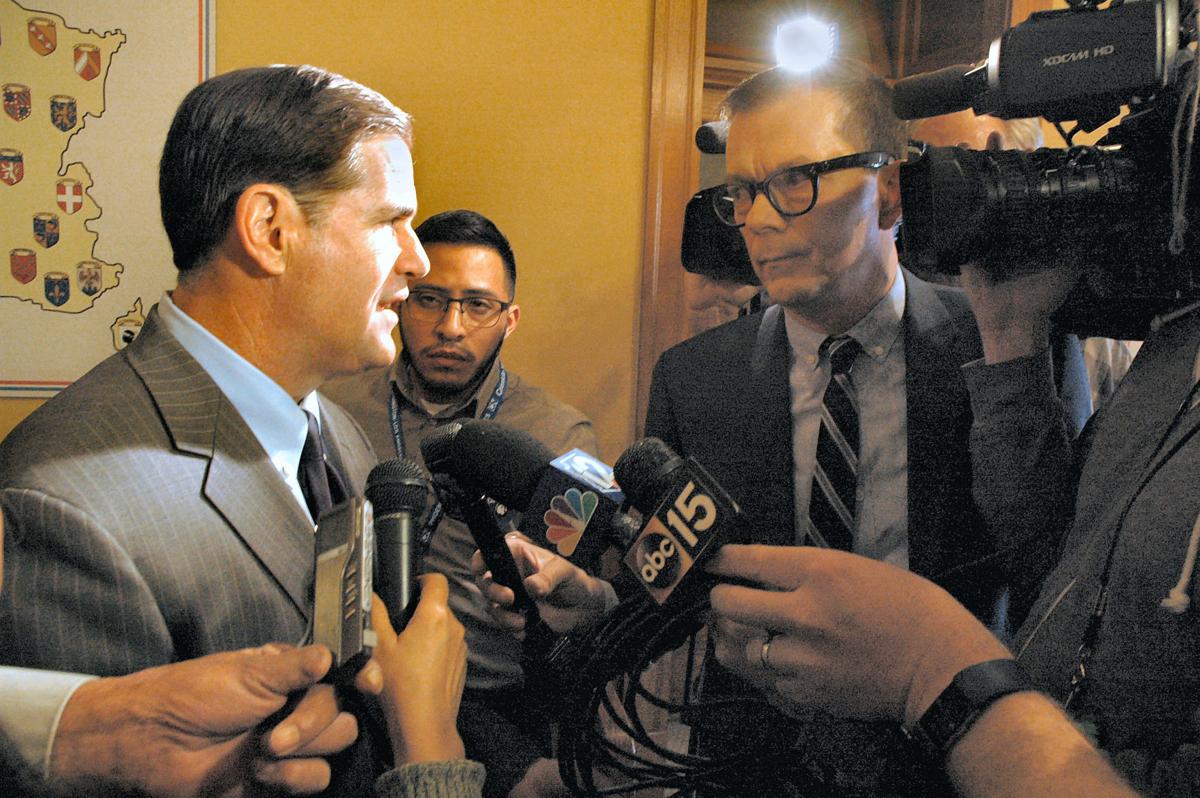Gov. Doug Ducey is defending his decision not to include universal background checks in his new school safety program.
The governor said Wednesday he believes the big hole in the system of background checks is not that it does not apply to person-to-person sales, including at gun shows, but that information is missing in the database that federal firearms dealers are required to use to determine if someone can possess a gun.
“You always hear about background checks after every one of these tragedies,” Ducey said during a telephonic press conference with rural newspapers to promote his Safe Arizona Schools plan. “But I don’t think most Arizonans understand how poorly populated the background checks are.”
For example, he said, the state’s own criminal history database, to which the federal database is linked, is less than two-thirds complete. He blamed that that on an out-of-date system for updating it and said his plan will include money to make the upgrades.
And Ducey said there also will be a requirement for police to file updates within 24 hours.
“Today it’s 40 days,” he said.
But the governor sidestepped a direct question of why he did not propose both fixing the database problems and ensuring that the sales of all firearms — including those made at gun shows — are run through that system.
“This is the part of the background check we’re going to fix,” he said. “And this is the largest part of the background check to be fixed.”
In a separate interview Wednesday on KFYI, however, the governor suggested there was a specific reason behind his decision not to include the controversial gun-show proposal in the package.
“Politics is the art of the possible,” he said. And gubernatorial press aide Daniel Scarpinato confirmed that his boss is focused on getting something done.
“The governor created this plan in a way that was something that could not only get through the Legislature but could have support from everyone, anyone who looks at this from a common-sense approach,” he said.
But Ducey also said there was something else at work as he crafted the package.
“To me, the Second Amendment was something that was going to be respected from the get-go,” he said. “I have no desire and will never take a gun from a law-abiding Arizonan or American.”
The governor also said he believes that simply making the database records more accurate will help prevent future mass killings. He cited the incident last November in Sutherland Springs, Texas, where 26-year-old Devin Patrick Kelley killed 26 and wounded 20 others in a small church.
“The man had been court-martialed previously for domestic violence and abuse of his wife and stepson,” the governor said.
“But neither the arrest or conviction was entered into the National Criminal Information Center database,” Ducey continued. “What we’re doing here would solve that issue and he wouldn’t have been able to purchase a firearm.”
The governor acknowledged, though, that a truly accurate database will require other states to also upgrade their own systems and reporting.
Ducey’s plan, unveiled Monday, includes other measures, like allowing judges to take guns from those considered a danger to self and others, money for more school resource officers, a central tip line where teachers and students can anonymously report dangerous situations and making Medicaid dollars available to schools to provide mental health counseling for eligible children.
But an organization founded by former Congresswoman Gabrielle Giffords and husband Mark Kelly on Wednesday declared the proposal falls short of what’s needed.
“We are glad to see that Gov. Ducey recognizes the need to find bipartisan solutions that will help address the epidemic of gun violence in the country,” said Peter Ambler, executive director of the group that bears Giffords’ name.





